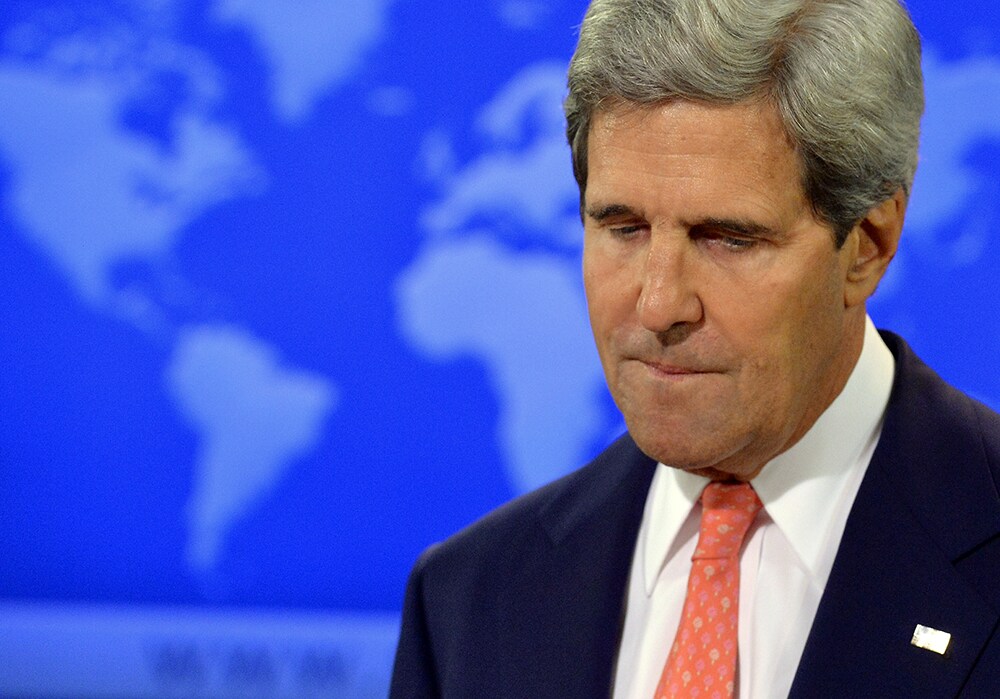
Max Fisher
Max Fisher is the Post's foreign affairs blogger. He has a master's degree in security studies from Johns Hopkins University. Sign up for his daily newsletter here. Also, follow him on Twitter or Facebook.
It’s difficult to find a single sentence in Secretary of State John Kerry’s forceful and at points emotional press conference on Syria that did not sound like a direct case for imminent U.S. military action against Syria. It was, from the first paragraph to the 15th, a war speech.
Karen DeYoung and Anne Gearan wrote, "Kerry left little doubt that the decision for the United States is not whether to take military action, but when.”
Kerry made the moral case for attacking Syria. He described what’s happening in Syria as "the indiscriminate slaughter of civilians, the killing of women and children and innocent bystanders by chemical weapons,” which he called "a moral obscenity” and "inexcusable.”
Kerry made the international norms case for striking Syria. "All peoples and all nations who believe in the cause of our common humanity must stand up to assure that there is accountability for the use of chemical weapons so that it never happens again,” he said. The argument here is that punishing Assad’s use of chemical weapons matters "beyond the conflict in Syria itself,” because the world wants to deter future military actors from using chemical weapons.
Kerry hinted at international coalition-building, saying that he’d spoken "with foreign ministers from around the world.” He later said that "information [about the attack] is being compiled and reviewed together with our partners.”
The United States is not going to win approval from the United Nations Security Council, where Russia has consistently opposed even milquetoast resolutions condemning Assad. But Kerry still made a point of gesturing toward the institution it’s about to bypass, saying, "At every turn, the Syrian regime has failed to cooperate with the U.N. investigation, using it only to stall and to stymie the important effort to bring to light what happened in Damascus in the dead of night.” He accused Assad of blocking U.N. inspectors and "systemically destroying evidence.”
Kerry also nodded to a legal case for war, saying of Syria’s chemical weapons use that "this international norm cannot be violated without consequences.” He said that "our understanding of what has already happened in Syria is grounded in facts, informed by conscience, and guided by common sense.” He cited as evidence, "firsthand accounts from humanitarian organizations on the ground, like Doctors Without Borders and the Syria Human Rights Commission, these all strongly indicate that everything these images are already screaming at us is real, that chemical weapons were used in Syria.”
He left Assad no room for anything he could do to change the Obama administration’s mind, strongly implying that the window had closed. "The regime’s belated decision to allow access is too late, and it’s too late to be credible,” he said.
Kerry diverted from the case for military intervention only to pressure Russia. Never more than implicitly — he did not mention the country by name — but the signals were alarm-bell clear. Russian officials stated earlier Monday that they didn’t believe any attack had occurred, which is consistent with their long-standing support for Assad. Kerry said, in clear reference to this, "Anyone who could claim that an attack of this staggering scale could be contrived or fabricated needs to check their conscience and their own moral compass.”
Kerry’s last line summed up his primary point, which he’d made repeatedly, that this was about enforcing an international norm against something too severe and serious to ignore: "President Obama believes there must be accountability for those who use the world’s most heinous weapons against the world’s most vulnerable people.”
That’s not a speech you give if you’re thinking about whether or not to strike. That’s a speech you give if you’ve already decided to strike and are building a case, a coalition and an action plan. Judging by Kerry’s comments, it’s just a matter of time.



_jpg/250px-ElbeDay1945_(NARA_ww2-121).jpg)





